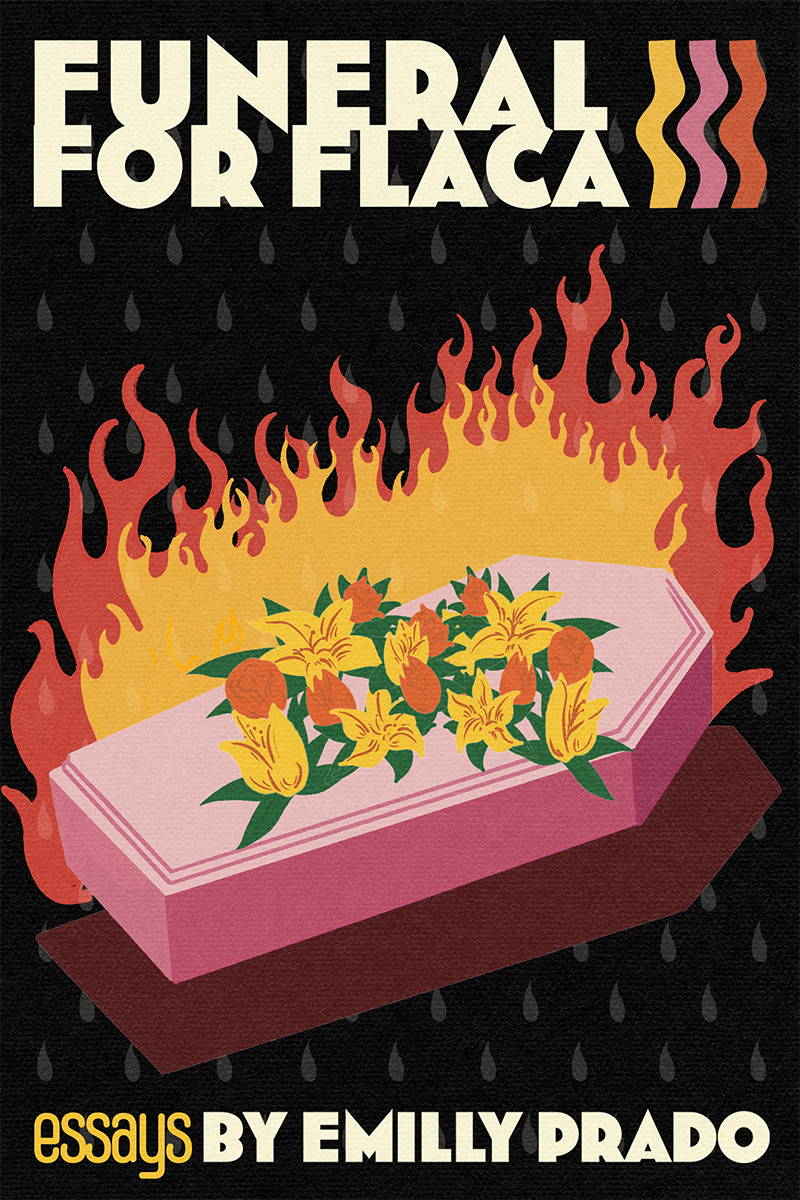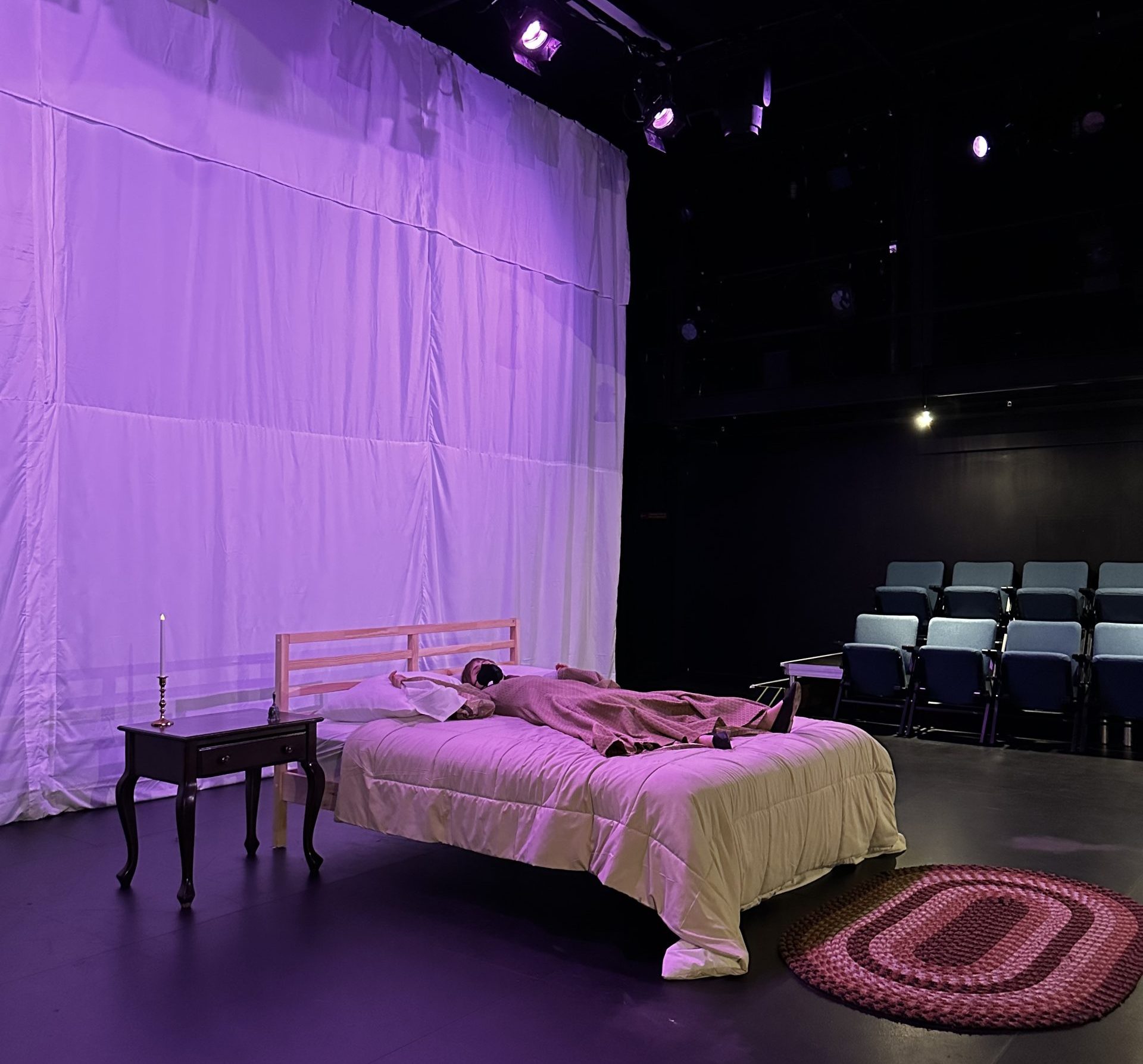On the front cover, a light pink coffin is decorated with yellow and orange flowers. Flames lick at the coffin, which is set against a dark background. On the back cover, a table is covered in a pink cloth, adorned with candles, photographs and food and framed by vases of marigolds—an ofrenda, the traditional altar for Day of the Dead.
“[The cover] was like a blending of different rights of grief or passing. I like fire for its sense of cleansing,” said Emilly Prado, author of Funeral for Flaca. “And on top of that, I felt like my experience is not exactly a traditional Mexican experience; it’s a Mexican-American experience. So why not twist this tradition a little bit and create this burning coffin that’s pink?”
Press for Funeral for Flaca says it’s an exploration of things lost and found—love, identity and family—and the traumas that transcend bodies, borders, cultures and generations. The collection, published by Future Tense Books, spans Prado’s life from childhood to the days of the COVID-19 pandemic, from the San Francisco Bay area to Portland, Oregon.
During her time at Portland State, Prado pursued a bachelor’s degree in Child and Family Studies and was aiming to become a teacher.
“I’m really grateful to have done that degree because I do think that it gave me the systems analytical lens that informs my work now,” Prado said. “I did really want to study writing, and it just didn’t feel practical at the time to do that.”
After graduation, Prado went on to become an award-winning multimedia journalist, with her writing and photographs appearing in over 30 publications. Funeral for Flaca was initially self-published as part of Prado’s completion of a certification in Prose and Book Making from the Independent Publishing Resource Center. She co-founded the artistry organization Portland in Color and the Latinx DJ collective Noche Libre, with which she performs as DJ Mami Miami. Although her career path did not take her into the role of teacher, Prado still positively impacts today’s youth as the Director of Youth Programs at Literary Arts.
With Funeral for Flaca, Prado hopes to reach girls like herself: “I wrote the book for a very specific audience, basically brown girls, especially 13-year-old me.” Recognizing trauma and the (often long) healing process are crucial themes Prado hopes readers take away from the collection—not just on an individual level but also on an institutional level.
“The biggest thing that I would like an institutional aspect to receive from [the book] is that, once students are struggling—often, if not always—it’s because things are happening at home, their needs aren’t being met, they could be experiencing trauma,” Prado said. “Have empathy, but also maybe check in with students more and see what’s going on, get to know them, because that was my experience.”
Funeral for Flaca will be used as part of the curriculum for the PSU class Working with Latinx Youth, taught this summer by Professor Cynthia Gomez.
“In my class, students work with justice-impacted youth,” Gomez said. “I often tell my students, the majority of which are Latinx, that these youth often don’t have the opportunity to see ‘successful’ people that look like them.”
Gomez said it is “a gift to be present in youth’s lives” for this purpose.
“They are role models for these youth,” Gomez continued. “Similarly, PSU Latinx students lack mentors and role models that look like them. Emilly is an example of a Latinx leader who is following her dream and finding an audience.”
When asked what advice she would give her undergrad self, Prado emphasizes not trying to force one’s path to follow a straight line.
“Most people’s paths are not linear, whether that’s with healing or your career,” Prado said. “It’s okay to change course; it’s important to listen to your intuition. I feel like all of the things that I’ve done in the time since have all informed and benefited what I do now.”
There is a long-standing myth that “real” writers have to be professionally trained. But, like Prado’s path to publication shows, college classes are not the only way to strengthen one’s writing skills.
“There are plenty of free workshops, community workshops, now with workshops on Zoom,” Prado explained. “There’s way more access. So if finances are a constraint, I’d suggest that people look online for other options. You don’t have to learn writing through an institution.”
For emerging writers in particular, Prado advises one main thing: write.
“If you are interested in writing, or think you might have a story to tell, definitely write and definitely listen to your intuition,” she said. “I think it’s something that took me a while to come back to. I had grown up journaling, and then I sort of lost that. But writing is just super healing. You can be a writer and not also want to publish, those are different things.”
“And be sure to surround yourself and find a community that’s supportive of you,” Prado said. “It’s just important to find people who are going to respect your vision, want to read your story and are ready to amplify what you’re doing and support it.”





